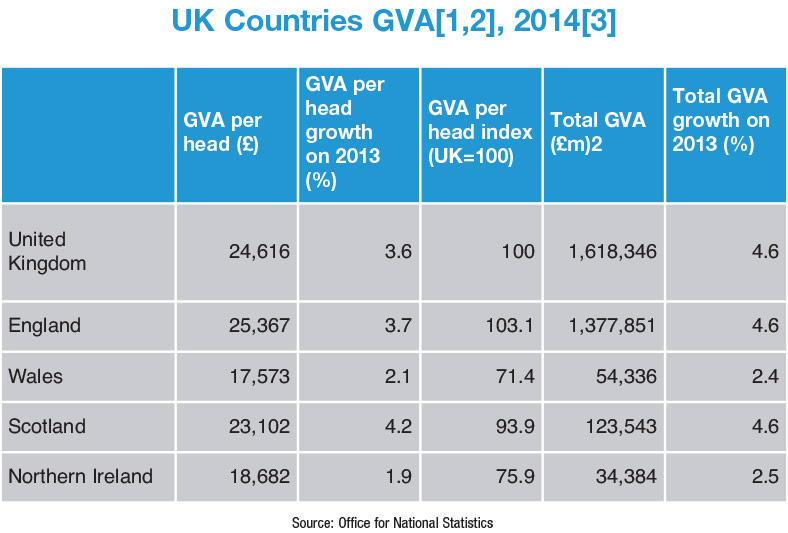Action needed on productivity gap
 Northern Ireland has a productivity problem and a cursory glance at the main productivity measures indicates that things are getting worse, writes Paul Mac Flynn.
Northern Ireland has a productivity problem and a cursory glance at the main productivity measures indicates that things are getting worse, writes Paul Mac Flynn.
When compared to the UK, Northern Ireland is producing three quarters of the average UK output per person. During the boom years this narrowed but productivity gap between Northern Ireland and the UK is now as large as it was in 1997. In Northern Ireland we can only measure Gross Value Added rather than Gross Domestic Product so it is better to make regional comparisons using GVA. The average annual growth rate of GVA per head of population in the 10 years leading up to 2007 was 2.7 per cent in Northern Ireland, just ahead of the 2.6 per cent UK average. The UK economy began to grow again in late 2009 and since then the average annual growth rate was 1.2 per cent, but in Northern Ireland it was just 0.1 per cent.
That there are regional differences in productivity levels and growth rates within the UK is not that surprising. That it is so large for Northern Ireland is concerning. There have been attempts to explain away Northern Ireland’s productivity problem as a purely structural issue however a persistent gap remains even after accounting for these issues.
The first explanation offered is that Northern Ireland has a lower employment rate than the rest of the UK. If we have less people working in the economy in Northern Ireland then a per head of population measure of growth would naturally underestimate Northern Ireland’s productivity, and it does. We can correct for this by measuring Gross Value Added per employee instead of per head of population. In this case Northern Ireland’s gap with the rest of the UK falls from 25 per cent to 13 per cent. To be clear this does not mean that half of Northern Ireland’s productivity problem can be dismissed because we have lower labour force participation. Even if Northern Ireland could match the employment rate of the rest of the UK, the people that are brought into the workforce may not be as productive as those already in it. A lower rate of employment does not excuse part of the gap, it explains part of the gap.
The other most common explanation is that Northern Ireland has a different mix of industries and therefore cannot produce the same level of output as the rest of the UK. The basic thrust of this point is that if Northern Ireland had more people working in banks than on farms, we could expect UK levels of growth. We can account for this by adjusting Northern Ireland’s economy so it looks more like that of the UK as a whole. This involves calculating sectoral level productivity measures or how much output is produced by a worker in each individual industry. Then we can redistribute workers in Northern Ireland to industries on the same basis as the UK average and tally up the resulting total output. On this measure the gap between Northern Ireland and the UK drops further, but only to 8 per cent.

That such a gap persists even after both of the above adjustments shows that the productivity problem runs deeper than the structure of the economy. Irrespective of the number of people at work or where they work, Northern Ireland still underperforms. To examine this problem more closely it is instructive to look at the two elements of productivity, capital and labour. Quite simply either workers can become more productive or the machinery and technology they work with can.
On labour productivity Northern Ireland does have a problem. Looking at the skills level of those of working age, Northern Ireland falls significantly behind the UK on every measure. Most alarmingly we have almost double the percentage of people with no qualifications at 16 per cent. On closer examination however the skills gap is not as clear cut as it first seems and the OECD Survey of Adults Skills provides some interesting insights on this. On basic skills such as literacy and numeracy, those in employment in Northern Ireland compare favourably. However, years of education is a significantly lower determinant of employment in Northern Ireland than it is in England (no UK figure is available). This contrasts with wages where the return on years of education in Northern Ireland exceeds that in England. This indicates that the problem of skills in Northern Ireland may be as much a problem of demand as it is of supply.
On the supply side, if the chances of getting employment do not depend on seeking more education then a very important incentive for skills accumulation amongst the young disappears. Conversely though, once in employment, gaining higher wages very much depends on years of education, but for many workers that opportunity has passed. This disparity of incentives may explain the origin of Northern Ireland’s skill shortage.
On the demand side however, while Northern Ireland may have a significantly lower skills profile, more workers are considered to be ‘well matched’ to their qualification than comparable workers in England. It is as important to incentivise employers to demand skills as it is to encourage workers to attain them.
Such a lack of ambition amongst firms in Northern Ireland could help explain the other side of productivity, capital. While there is a dearth of data on private investment in Northern Ireland, the UK-wide Innovation survey does provide some small insights. Northern Ireland has the lowest rate of innovation among all UK regions, 5 per cent below the UK average. In the production sector the lack of innovation is largest among large firms while it is SME’s in the services sector who fell far behind the UK average. Possibly the most interesting finding was that the most common reason for lack of innovation was the absence of any necessity to do so. Market conditions did not warrant innovation, therefore it did not happen.
Bringing all of this together it is clear that in order to tackle Northern Ireland’s productivity problem it will be as much about modifying behaviour as it will be about uprooting embedded structures. Most importantly it will require policy action on both the supply and demand side. There is no benefit in policies aimed at boosting the supply of highly skilled workers and low cost financing to firms who do not have the appetite or the ability to use them.
Paul Mac Flynn is an economist at the Nevin Economic Research Institute (NERI) specialising in the Northern Ireland Economy.





